- Research
- People
- Graduate
-
Undergraduate
-
Undergraduate Studies
- Overview
- How to Declare
- Bachelor of Arts in Biology (B.A.)
- Bachelor of Science in Biology (B.S.)
- Biology Minor
- Concentration in Environmental and Biological Conservation
- Biology Undergraduate FAQ
- Undergraduate Research
- Distinguished Majors Program
- iGem at UVA
- Human Biology Distinguished Major Program
- Biology Major Email List
- Related Information
-
Undergraduate Studies
- News & Events
- Connect
Past Seminars
Spring 2026
February 20, 2026 - Michael Krashes, PhD

NIH National Institute of Diabetes and Digestive and Kidney Diseases
Hosted by: John Campbell, PhD
12:00 PM - 1:00 PM | Gilmer Hall Auditorium 390
Add to Calendar
February 6, 2026 - Bodenstein Lecture Series - Ken Poss, PhD

Hosted by: David Parichy, PhD
Lecture Details
Fall 2025
August 29, 2025 - Richard A. Lang, PhD
Professor and Endowed Chair
University of Cincinnati Department of Ophthalmology
Opsins 3, 4 and 5, in development, homeostasis and disease, inside and outside the eye
The non-visual opsins OPN3 (encephalopsin), OPN4 (melanopsin), and OPN5 (neuropsin) are short-wavelength photon detectors with crucial roles in mammalian physiology. We have learned that all three opsins have important roles inside and outside the eye, in guiding developmental processes and regulating energy homeostasis in adults.
Hosted by: Ignacio Provencio, PhD
12:00 PM | Gilmer Hall Auditorium 390 | Add to Calendar
September 5, 2025 - Seham Ebrahim, PhD
Assistant Professor, Molecular Physiology and Biological Physics | University of Virginia School of Medicine
When force is necessary- exploring the structure and function of mechanosensory complexes across organs
Mechanical forces shape physiology across organs, from sensing sound in the inner ear to maintaining barrier function in the gut. This talk will explore how transmembrane channel-like (TMC) proteins assemble into mechanosensory complexes and how their structure and localization drive tissue-specific functions. By integrating cell biological, genetic approaches, computational and structural approaches, we uncover common principles and organ-specific adaptations of these fascinating channels.
Hosted by: Ariel Pani, PhD
12:00 PM | Gilmer Hall Auditorium 390 | Add to Calendar
September 12, 2025 - David Hembry, Ph.D.
Assistant Professor | James Madison University
Macroevolution and persistence of insect-plant mutualisms
We live in a biosphere pervaded by mutualisms, although theory suggests that mutualisms should be vulnerable to both breakdown and species loss. These problems may be especially acute for highly specialized mutualisms. Here I use both phylogenetic comparative methods and species interaction networks to examine the macroevolutionary persistence of a specialized brood pollination mutualism between leafflower plants (Phyllanthaceae) and leafflowermoths (Lepidoptera: Gracillariidae: Epicephala), which are both pollinators and seed predators of their host plants
Hosted by: Laura Galloway, PhD and Katja Kasimatis, PhD
12:00 PM | Gilmer Hall Auditorium 390 | Add to Calendar
September 19, 2025 - Larry S. Zweifel, PhD
Professor of Psychiatry and Behavioral Sciences | University of Washington
Unravelling the complex regulation of the brain's dopamine system
Dopamine releasing neurons of the ventral midbrain regulation numerous motivated behaviors and emotional processes. We have performed comprehensive analysis of the genetic heterogeneity in these cells, the circuits that control them, the signaling pathways that regulate them, and the ion channels that give them their signature encoding properties. I will summarize how we think the system is organized to mediate its many functions.
Hosted by: Ali Guler, PhD and Christopher Deppmann, PhD
12:00 PM | Gilmer Hall Auditorium 390 | Add to Calendar
September 26, 2025 - Sarah Siegrist, PhD
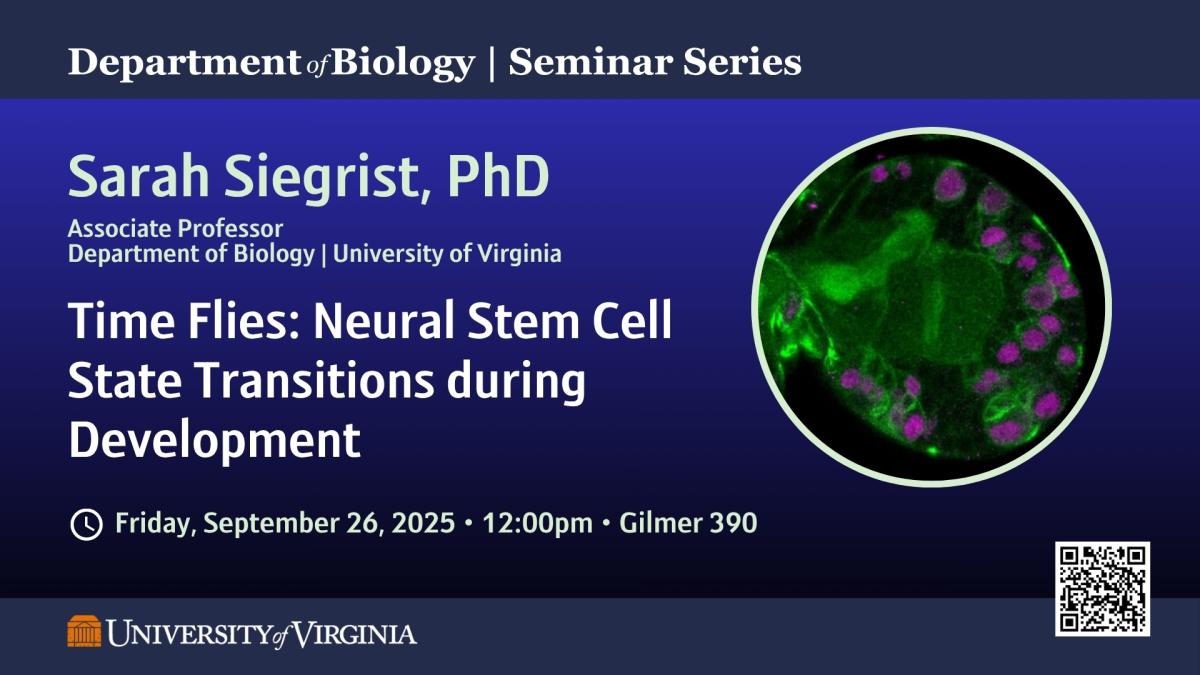
Associate Professor | Department of Biology | University of Virginia
Time Flies: Neural Stem Cell State Transitions during Development
12:00 PM | Gilmer Hall Auditorium 390
October 3, 2025 - Lesley Weaver, PhD
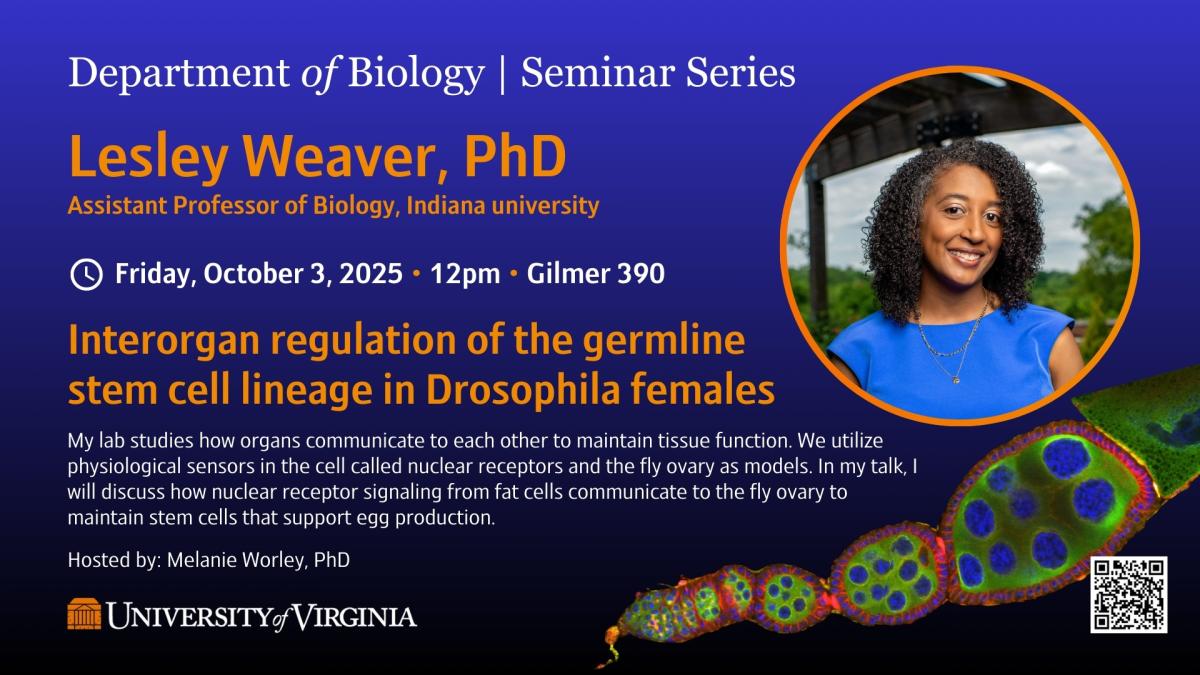
Assistant Professor of Biology | Indiana university
Interorgan regulation of the germline stem cell lineage in Drosophila females
My lab studies how organs communicate to each other to maintain tissue function. We utilize physiological sensors in the cell called nuclear receptors and the fly ovary as models. In my talk, I will discuss how nuclear receptor signaling from fat cells communicate to the fly ovary to maintain stem cells that support egg production.
Hosted by: Melanie Worley, PhD
12:00 PM | Gilmer Hall Auditorium 390 | Add to Calendar
October 10, 2025 - Shweta Bansal, PhD
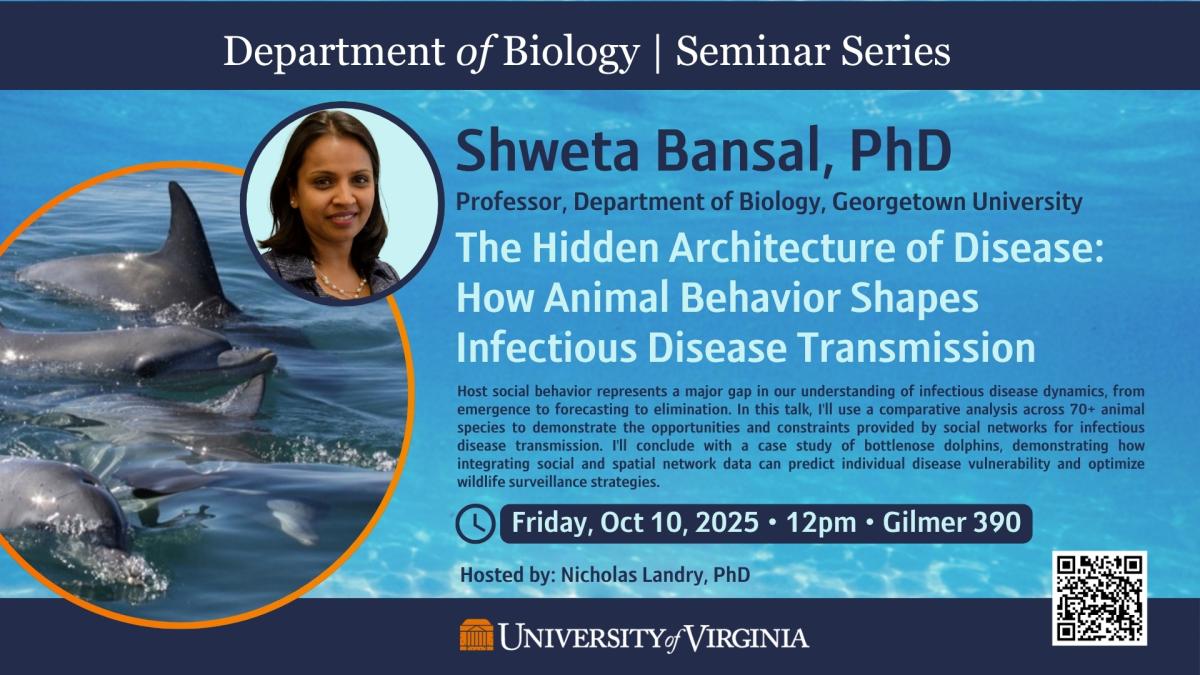
Department of Biology | Georgetown University
The Hidden Architecture of Disease: How Animal Behavior Shapes Infectious Disease Transmission
Host social behavior represents a major gap in our understanding of infectious disease dynamics, from emergence to forecasting to elimination. In this talk, I'll use a comparative analysis across 70+ animal species to demonstrate the opportunities and constraints provided by social networks for infectious disease transmission. I'll conclude with a case study of bottlenose dolphins, demonstrating how integrating social and spatial network data can predict individual disease vulnerability and optimize wildlife surveillance strategies.
Hosted by: Nicholas Landry, PhD
12:00 PM - 1:00 PM | Gilmer Hall Auditorium 390 | Add to Calendar
October 17, 2025 - Robin Hopkins, PhD
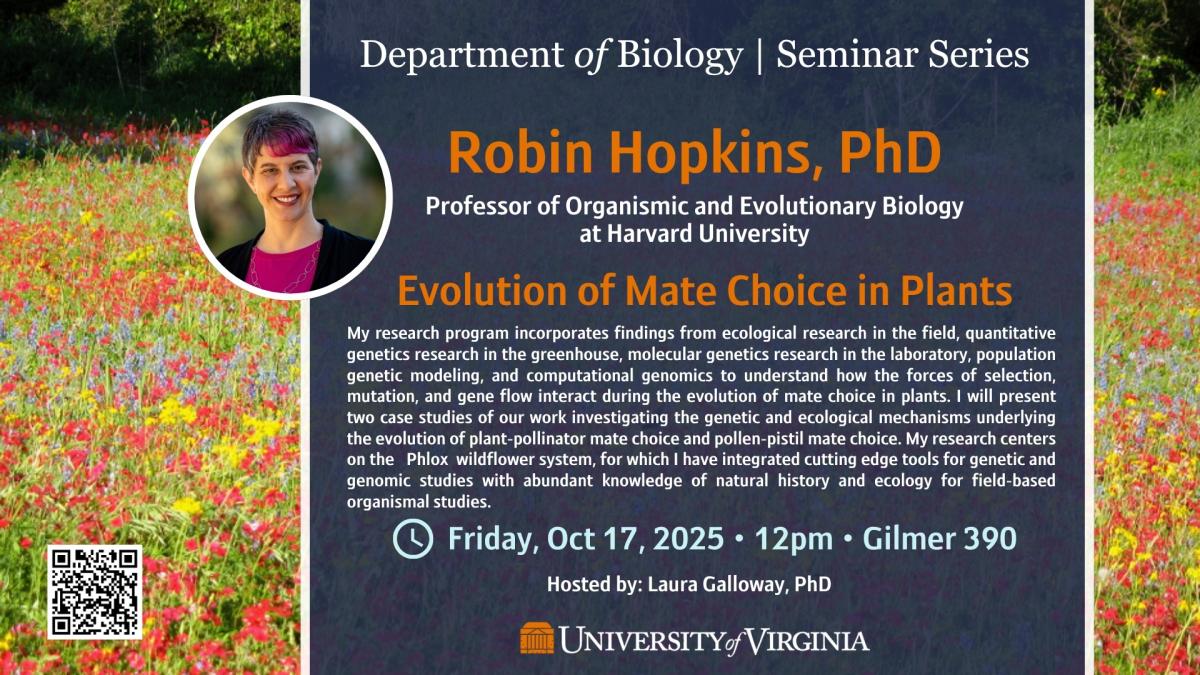
Professor of Organismic and Evolutionary Biology at Harvard University
Evolution of Mate Choice in Plants
My research program incorporates findings from ecological research in the field, quantitative genetics research in the greenhouse, molecular genetics research in the laboratory, population genetic modeling, and computational genomics to understand how the forces of selection, mutation, and gene flow interact during the evolution of mate choice in plants. I will present two case studies of our work investigating the genetic and ecological mechanisms underlying the evolution ofplant-pollinator mate choice and pollen-pistil mate choice. My research centers on the Phlox wildflower system, for which I have integrated cutting edge tools for genetic and genomic studies with abundant knowledge of natural history and ecology for field-based organismal studies.
Hosted by: Laura Galloway, PhD
12:00 PM - 1:00 PM | Gilmer Hall Auditorium 390 | Add to Calendar
October 24, 2025 - Prash Rangan, PhD
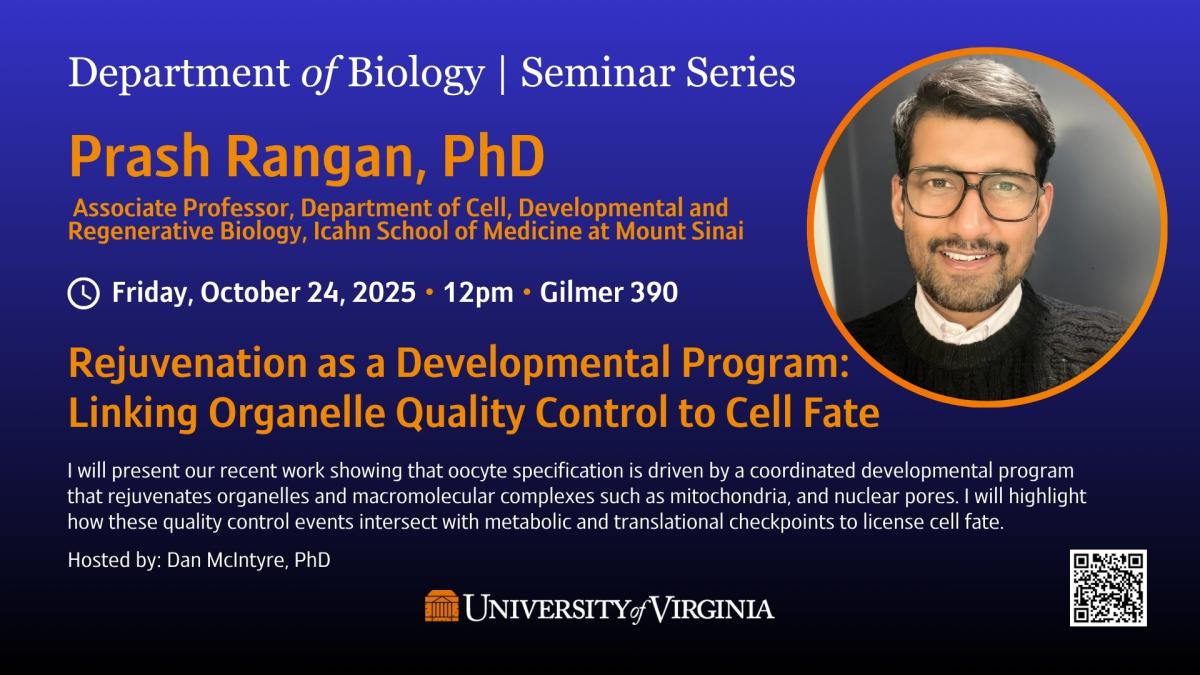
Associate Professor, Department of Cell, Developmental and Regenerative Biology, Icahn School of Medicine at Mount Sinai
Rejuvenation as a Developmental Program: Linking Organelle Quality Control to Cell Fate
I will present our recent work showing that oocyte specification is driven by a coordinated developmental program that rejuvenates organelles and macromolecular complexes such as mitochondria, and nuclear pores. I will highlight how these quality control events intersect with metabolic and translational checkpoints to license cell fate.
Hosted by: Dan McIntyre, PhD
12:00 PM - 1:00 PM | Gilmer Hall Auditorium 390 | Add to Calendar
October 31, 2025 - Tera Levin, PhD

Assistant Professor, Department of Biological Sciences
University of Pittsburgh
The evolution of immunity and pathogenesis within environmental microbial battlegrounds
New infectious diseases routinely emerge from natural reservoirs, with sometimes devastating consequences. How does this happen? Specifically, what events within natural environments allow proto-pathogens to evolve virulence and eventually jump to humans? Using the bacterium Legionella pneumophila, we study the evolution of microbial virulence in response to natural microbial predators such as amoebae. I will present experiments showing the significant impacts of these invisible host-microbe interactions on bacterial evolution, as well as our studies of the “immune” defenses of amoebae and the evolutionary origins of our own innate immune pathways. Together, we expect these studies will help to uncover the process of new pathogen emergence. They will also reveal what aspects of immunity pathogens encounter (and adapt to overcome) in the wild, long before these microbes ever meet their first human.
12:00 PM - 1:00 PM | Gilmer Hall Auditorium 390 | Add to Calendar
November 21, 2025 - Sebastian Stockmaier, PhD

Assistant Professor, Department of Ecology and Evolutionary Biology University of Tennessee, Knoxville &Smithsonian Tropical Research Institute
Merging behavioral and disease ecology: Insights from vampire bats
This seminar explores how animal behavior is both influences and is shaped by infections. Drawing on research from our lab, we’ll examine how infections affect social relationships, pathogen manipulation of hosts, and how cross-species interactions could drive disease dynamics between vampire bats and livestock.
Hosted by: Amanda Gibson, PhD
12:00 PM - 1:00 PM | Gilmer Hall Auditorium 390 | Add to Calendar
December 5, 2025 - Andrew Hardaway, PhD

Assistant Professor, Department of Psychiatry and Behavioral Neurobiology, University of Alabama at Birmingham
The Central Amygdala Integrates Exogenous and Endogenous GLP-1 Signals
In this presentation I will present our most recent findings on how the central amygdala regulates behavioral responses to exogenous GLP-1 analogs and endogenous GLP-1
Hosted by: Ali Güler, Phd
12:00 PM - 1:00 PM | Gilmer Hall Auditorium 390 | Add to Calendar
View printable flyer: